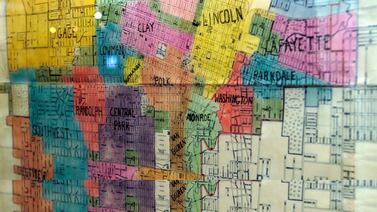Sign up for Chalkbeat Chicago’s free daily newsletter to keep up with the latest education news.
Chicago Public Schools is planning to purchase up to 50 electric school buses to operate its own fleet with a $20 million federal grant from the Environmental Protection Agency.
The additional money comes as the district continues to struggle to provide students with transportation. The district has not operated its own bus fleet for more than a decade. It contracts with outside vendors to provide bus service and has been grappling with a driver shortage since the pandemic hit.
CPS announced just before winter break that it would not be adding bus service for general education students, many who attend selective or magnet schools, for the remainder of the year. They cut service to those students at the start of the school year in order to ensure students with disabilities, who are legally entitled to transportation, were being routed and weren’t riding the bus more than an hour.
But the federal grant and new buses will not immediately fix those issues. For one, 50 buses “will not be enough to provide service to the entire district,” a district spokesperson said. The process for buying and deploying the electric buses will start on April 1, 2024 and happen over a three-year period, the spokesperson said.
The Chicago Teachers Union applauded the grant and said the news was a sign of better collaboration between the union, the district, and the mayor, who is a former CTU organizer. The statement issued by the union said the award would “allow CPS to hold private bus vendors accountable for another 140 electric buses that will replace their current diesel-powered fleets.”
About $81 million is being awarded to private bus vendors that serve Illinois and other states, according to the EPA. First Student Inc. – which operates yellow buses in Illinois, Indiana, Ohio, Michigan, Minnesota, and Wisconsin – is getting $39.4 million to purchase 100 electric buses; Student Transportation of America Inc is also in line to receive $12.2 million to purchase 32 buses in Illinois and Wisconsin; and Highland CSB 1 is expected to get $29.4 million to purchase 98 buses in Illinois, Ohio, Michigan, Minnesota, and Wisconsin.
A news release from Chicago Mayor Brandon Johnson’s office said the goal will be to deploy the new buses in communities “most impacted by poor environmental policies and practices, and historic disinvestment.” Johnson ran on a promise to update school facilities to be more environmentally friendly and energy efficient.
In all, the federal government is doling out more than $1 billion to fund electric buses across 280 school districts.
In Philadelphia, the school district is in line for $8 million to add 20 electric buses to its fleet, doubling the current 20 it operates. Detroit Public Schools is expected to get nearly $6 million to buy 15 electric buses.
The move comes as districts nationwide are looking to shift to clean energy buses. Colorado also announced plans last August to expand electric buses in more than a dozen school districts using state and federal funding. New York state announced in 2022 it wants all new school buses to be zero-emissions by 2027.
The federal Clean School Bus Program also provides rebates to districts that use electric buses. Thirteen school districts in Illinois, most of them downstate, got more than $46 million in those rebates last school year to operate electric buses, according to data from the EPA.
Becky Vevea is the bureau chief for Chalkbeat Chicago. Contact Becky at bvevea@chalkbeat.org.







